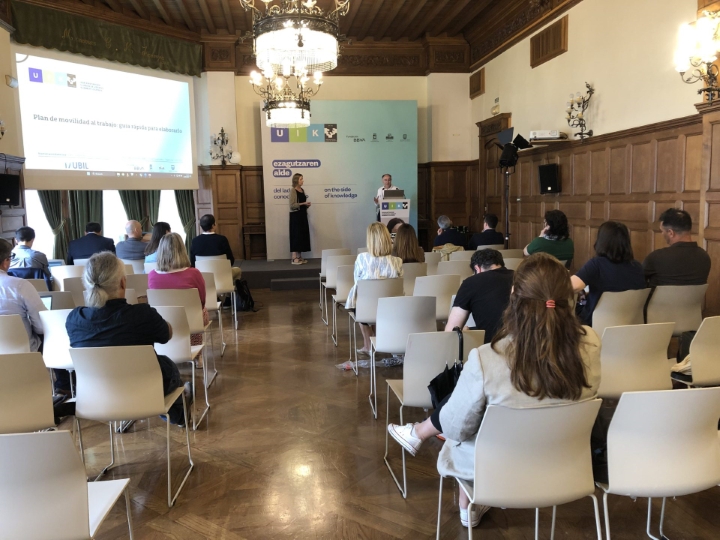Mobility to work scheme, a competitive advantage for all companies

In the Basque Country, they are compulsory for companies with more than 100 employees, but the implementation of mobility to work plans has advantages for all businesses.
Savings in consumption and labour matters are some of the expenditure items that benefit from the implementation of work mobility plans in companies.
 Mobility to work plans were the focus of the summer course organised annually by the Mobility and Logistics Cluster of the Basque Country for the University of the Basque Country. In the Basque Country, they are compulsory for companies with more than 100 workers but, in general, they are a competitiveness factor that not only benefits the environment, but also has a direct impact on the economy of companies and workers. This is what emerged from a session that included experts in regulations from the Basque Government and the General Directorate of Traffic, as well as representatives from Mubil, Ingartek and Sener.
Mobility to work plans were the focus of the summer course organised annually by the Mobility and Logistics Cluster of the Basque Country for the University of the Basque Country. In the Basque Country, they are compulsory for companies with more than 100 workers but, in general, they are a competitiveness factor that not only benefits the environment, but also has a direct impact on the economy of companies and workers. This is what emerged from a session that included experts in regulations from the Basque Government and the General Directorate of Traffic, as well as representatives from Mubil, Ingartek and Sener.
The conference began by contextualising the mobility plans as a tool that is added to various legislations and regulations on sustainability. Their aim is to reduce the environmental impact of commuting to work. In the Basque Country, this aim is already included in the Energy Sustainability Law and in the regulations that develop it, which apply to industrial companies with more than 100 workers per shift. It is also included in the draft Sustainable Mobility Law. At state level, the Sustainable Economy Act of 2011 already enunciated them and they were developed in the preliminary draft of the Sustainable Mobility Act, which has lapsed with the early elections and the dissolution of Parliament, but whose basic principles are expected to be maintained.
The context of the mobility to work plans was completed with their link to other initiatives such as Corporate Social Responsibility actions, the digital product passport or the Sustainable Development Goals, specifically with regard to sustainable cities, responsible production and consumption, climate action and health and wellbeing. The evolution of the sector itself, immersed in the energy transition and also in the application of solutions and technologies aimed at efficiency, environmental respect and safety, was also mentioned.
After the review of the situation and the reasons behind the adoption of mobility to work plans, the attendees had the opportunity to learn about the advantages of their application. In this sense, their impact not only on the competitiveness of companies but also on the well-being of workers, which can be extended to society as a whole, was highlighted. In this way, measures such as flexible start and finish times or the promotion of teleworking were presented, which, without constituting an expense, contribute to the reduction of congestion, stress or accidents. During the session, it was pointed out that 29% of accidents at work occur in itinere and 14% of traffic victims correspond to work-related journeys, with the human and economic cost that this entails. Savings in energy consumption and time off work are some of the areas of expenditure that benefit from the implementation of mobility to work plans in companies. For workers, continuous and flexible working hours and teleworking favour work-life balance and socialisation. And in the social framework, the improvement of congestion and the reduction of air and noise pollution that this entails, contribute to friendlier cities. It was also emphasised that mobility plan measures do not necessarily imply an additional cost for companies: many of them do not have any economic repercussions beyond encouraging changes in habits.
The course ended with a practical and participative session, dedicated to the effective development of a mobility plan. As it was explained, this work is organised in three blocks: data collection and diagnosis; descriptive report; and setting objectives and indicators. Regarding the latter, it was recommended that they should be measurable, attainable and achievable within a given timeframe, because, in addition, plans should be a living tool that can be updated from time to time. It also stressed the importance of drawing them up through participatory processes.
For the last six years, with the collaboration of the Provincial Council of Gipuzkoa and Mubil, the Mobility and Logistics Cluster of the Basque Country has been organising a summer course for the University of the Basque Country, always with the aim of promoting Sustainable Mobility.




